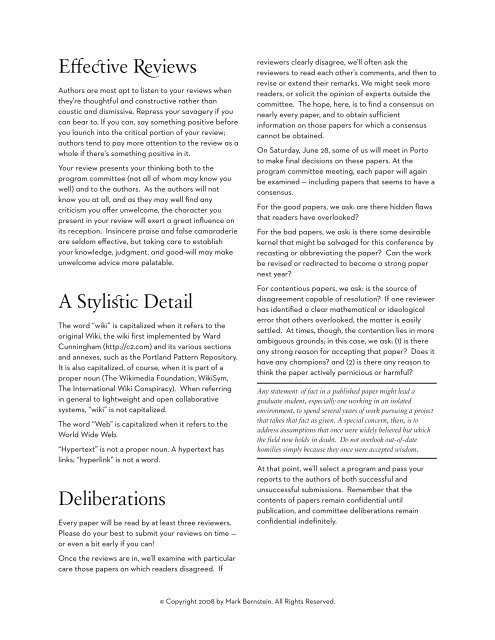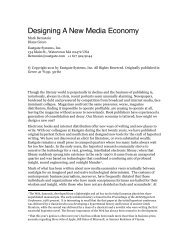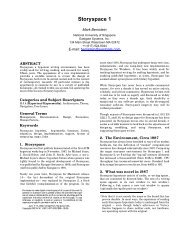Reviewing Conference Papers - Mark Bernstein
Reviewing Conference Papers - Mark Bernstein
Reviewing Conference Papers - Mark Bernstein
You also want an ePaper? Increase the reach of your titles
YUMPU automatically turns print PDFs into web optimized ePapers that Google loves.
Effective ReviewsAuthors are most apt to listen to your reviews whenthey're thoughtful and constructive rather thancaustic and dismissive. Repress your savagery if youcan bear to. If you can, say something positive beforeyou launch into the critical portion of your review;authors tend to pay more attention to the review as awhole if there's something positive in it.Your review presents your thinking both to theprogram committee (not all of whom may know youwell) and to the authors. As the authors will notknow you at all, and as they may well find anycriticism you offer unwelcome, the character youpresent in your review will exert a great influence onits reception. Insincere praise and false camaraderieare seldom effective, but taking care to establishyour knowledge, judgment, and good-will may makeunwelcome advice more palatable.A Stylistic DetailThe word “wiki” is capitalized when it refers to theoriginal Wiki, the wiki first implemented by WardCunningham (http://c2.com) and its various sectionsand annexes, such as the Portland Pattern Repository.It is also capitalized, of course, when it is part of aproper noun (The Wikimedia Foundation, WikiSym,The International Wiki Conspiracy). When referringin general to lightweight and open collaborativesystems, “wiki” is not capitalized.The word “Web” is capitalized when it refers to theWorld Wide Web.“Hypertext” is not a proper noun. A hypertext haslinks; “hyperlink” is not a word.DeliberationsEvery paper will be read by at least three reviewers.Please do your best to submit your reviews on time —or even a bit early if you can!Once the reviews are in, we’ll examine with particularcare those papers on which readers disagreed. Ifreviewers clearly disagree, we’ll often ask thereviewers to read each other’s comments, and then torevise or extend their remarks. We might seek morereaders, or solicit the opinion of experts outside thecommittee. The hope, here, is to find a consensus onnearly every paper, and to obtain sufficientinformation on those papers for which a consensuscannot be obtained.On Saturday, June 28, some of us will meet in Portoto make final decisions on these papers. At theprogram committee meeting, each paper will againbe examined — including papers that seems to have aconsensus.For the good papers, we ask: are there hidden flawsthat readers have overlooked?For the bad papers, we ask: is there some desirablekernel that might be salvaged for this conference byrecasting or abbreviating the paper? Can the workbe revised or redirected to become a strong papernext year?For contentious papers, we ask: is the source ofdisagreement capable of resolution? If one reviewerhas identified a clear mathematical or ideologicalerror that others overlooked, the matter is easilysettled. At times, though, the contention lies in moreambiguous grounds; in this case, we ask: (1) is thereany strong reason for accepting that paper? Does ithave any champions? and (2) is there any reason tothink the paper actively pernicious or harmful?Any statement of fact in a published paper might lead agraduate student, especially one working in an isolatedenvironment, to spend several years of work pursuing a projectthat takes that fact as given. A special concern, then, is toaddress assumptions that once were widely believed but whichthe field now holds in doubt. Do not overlook out-of-datehomilies simply because they once were accepted wisdom.At that point, we’ll select a program and pass yourreports to the authors of both successful andunsuccessful submissions. Remember that thecontents of papers remain confidential untilpublication, and committee deliberations remainconfidential indefinitely.© Copyright 2008 by <strong>Mark</strong> <strong>Bernstein</strong>. All Rights Reserved.




